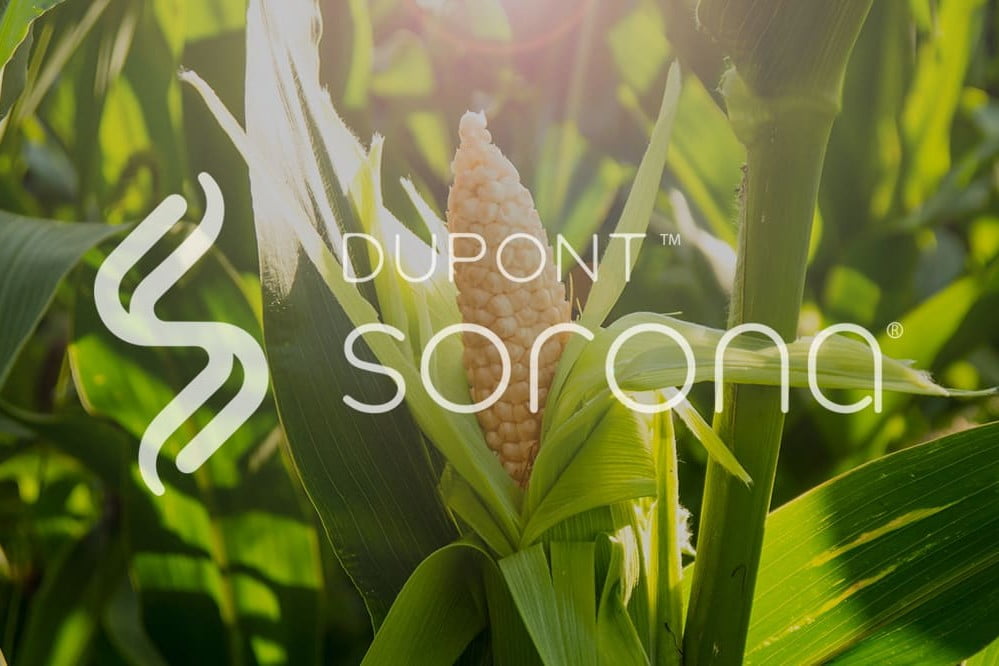As the world becomes more conscious of its environmental impact, the fashion industry is also evolving to become more sustainable. Eco-friendly fabrics are becoming increasingly popular as consumers are looking for sustainable alternatives to traditional fabrics that are overall neutral to the environment.
One such eco-friendly fabric alternative is Sorona. Sorona is a revolutionary fabric that is made using plant-based materials derived from corn, a renewable resource – making it a sustainable alternative to traditional fabrics. This innovative fabric has an overall lower impact on the environment as it requires less energy to produce and emits fewer greenhouse gasses during the manufacturing process.
Sorona also has a unique set of features that make it an attractive option for those who are looking for sustainable alternatives to traditional fabrics. The fabric is incredibly durable and has excellent elasticity, making it ideal for use in a variety of applications, including activewear and outdoor clothing, all of which will be later discussed in detail in the blog.
Overall, Sorona is the eco-friendly fabric alternative that is helping to strengthen our shared future by reducing the overall environmental impact. Besides, its unique features, durability, and versatility make it a trendy and attractive option for the current fashion scene globally.
Sorona Fabric: Composition and Features

Sorona is a new-generation fiber with a unique molecular structure that is 37 percent bio-based and derived from annually renewable crops. This bio-based, high-performance polymer is one of three commercial brands under CovationBio, a biomaterials company, that delivers sustainably sourced fabrics. Using sustainable bio-based feedstocks is crucial because bio-based goods help de-fossilize the global supply chain by separating the production of materials from the extraction of fossil fuels – ultimately lowering the world’s dependence on fossil fuels.
In the simplest terms, Sorona fabric is a special type of fabric that is made from plants – namely corn. This means it is better for the environment because it does not use as much energy or create as much pollution.
Unique Features
Below listed distinctive and exclusive features of Sorona fabric are making the fabric an attractive choice in the current market:
- Softness and Comfort – Sorona fabric has a smooth texture that feels gentle and pleasant against the skin – making it ideal for clothing, activewear, and home furnishings.
- Versatility – It is durable and suitable for a range of clothing applications, from athletic apparel to dressy clothing, and adaptable to various weather conditions as well.
- Breathability – The fabric allows air to flow through the material – making it comfortable to wear even in hot weather.
- Waterproof – Sorona fabric can also be made waterproof with a water-repellent coating – making it perfect for outdoor clothing and accessories.
- Stain-Resistant – Sorona is resistant to stains and odors – making it easy to care for and maintain.
- Easy to Dye – It is easy to dye the fabric while allowing a wide range of colors and patterns – thus making it a versatile choice for fashion designers and textile manufacturers.
Sustainability Factor
Sorona fabric is the sustainable alternative for the 21st century eco-friendly and responsible consumers conscious about reducing their carbon footprint. The production of Sorona requires 30% less energy and emits 63% fewer greenhouse gasses compared to the production of non-renewable nylon fabric, more commonly known as synthetic fabric. Moreover, the production also results in 40% less usage of water in comparison. Sorona aligns with the United Nations Sustainable Development Goal no. 12, “Responsible Consumption and Production”, as it reduces waste and promotes sustainable use of resources.
Thus, with its sustainable properties and positive impact on the environment, Sorona fabric is the alternative for green-conscious and eco-responsive consumers looking to make sustainable fashion choices.
Sorona Fabric: Market Position and Benefits
Benefits of Traditional Textiles
Sorona fabric provides multiple benefits over its traditional counterparts. The benefits are chiefly discussed from two aspects below:
- Energy efficiency – Sorona is made from renewable resources, namely corn, which reduces dependence on non-renewable resources like petroleum, crude oil, etc. In terms of energy efficiency, as mentioned earlier, Sorona fabric requires a huge percentage of less energy than traditional fabrics like nylon, polyester, rayon, etc. during the production process, also requiring a lesser percentage of water as well.
- Strength and Durability – Sorona fabric is incredibly durable and strong, withstanding wear and tear better than traditional fabrics. It has excellent stretch recovery and retains its shape even after multiple washes. This makes it ideal for use in activewear and other high-performance clothing. Besides the potential applications for this fabric in the apparel industry are only ever-expanding, making it suitable for a range of clothing applications and more durable over time.
Impact on Fashion Industry
Sorona, the revolutionary textile innovation, has emerged as a complete game-changer in the ready-made garments industry, leaving a lasting impact on the overall sector. Based on the information provided in a December 2021 interview by the current global brand and communications leader of CovationBio, Alexa Raab, the following impacts of Sorona fabric became explicitly visible in the ongoing fashion scene:
- With over 43 million garments featuring Sorona hangtags sold worldwide in just the first year, Sorona fabric is significantly visible in the fashion industry at present.
- Currently, over 500 mills are certified to carry Sorona fabric, thus showcasing the ever-growing popularity of this eco-friendly alternative.
- Sorona fabric is highly versatile in nature and for which it is used for a wide range of applications like makeup brushes, footwear, bedding, etc.
- Sorona is a durable and long-lasting fabric that is also suitable for a variety of fiber applications. This property in particular is responsible for the fabric has a strong grip over the activewear (sportswear, swimwear) segment of the industry.
- Sorona is being highly prized for its varied performance attributes in the current market. For example, Sorona is performing as both a comfort-based fabric for high performance and apparel for fashion-forward looks at the same time.
- One segment where Sorona is particularly observing significant growth is footwear. Puma has already launched a soccer shoe made with a Sorona and Susterra upper, while other brands like EcoAlf are also using Sorona in apparel items along with footwear.
Sorona Fabric: Trends and Future

Current Market Trends
The last two decades have been a tipping point for sustainability, and the demand for stronger commitments in the next two decades is only projected to be increasing. The fashion industry is becoming more focused on sustainability with more and more consumers becoming aware of the environmental impact of their purchases – ultimately leading to a rise in a sustainable fashion. The market trends currently in practice are also mainly revolving around the concept of sustainability. Some of those market trends are introduced below:
- The emergence of sustainable fashion brands – Brands that prioritize sustainability and ethical practices in their production processes are gaining increasing popularity among consumers.
- Increased use of natural and organic fabrics – Materials such as organic cotton, hemp, and linen are becoming more popular due to their minimal impact on the environment and their biodegradability.
- Growth of recycled materials – The use of recycled materials such as post-consumer plastic bottles, recycled cotton, and recycled polyester is gaining momentum in the fashion industry.
- Introduction of innovative eco-friendly fabrics – Newer eco-friendly fabrics such as Sorona, Tencel, and Piñatex (made from pineapple fibers) are gaining attention for their unique properties and sustainable production methods.
- Focus on circular fashion – There is a growing interest in a circular fashion which advocates for the reuse, repair, and recycling of clothing – reducing waste and minimizing the environmental impact of the fashion industry.
As brands and designers are incorporating eco-friendly fabrics into their collections, the global eco-friendly textile market is expected to reach a value of USD 160.8 billion by 2027. To summarize in a line, the fashion industry is currently witnessing a huge shift toward a sustainable and socially responsible approach, with eco-friendly fabrics at the forefront of this trend.
Future Outlook
With a growing awareness of the impact of the fashion industry on the environment, sustainable fashion is becoming more and more popular. In a recently published article by FIBER2FASHION, the global market for eco-friendly fabrics has been projected to reach $69.5 billion by 2025. And as a leader in the eco-friendly fabric space, Sorona is expected to capture a significant share of this market.
According to a recent survey by BusinessWire, a Berkshire Hathaway company, 75% of millennials believe it to be important for companies to be environmentally sustainable, and this sentiment is only likely to grow among future generations. Sorona’s commitment to sustainability and innovation, as well as its versatility and durability, make it well-positioned to become a leading fabric of choice for generations to come.
Furthermore, Sorona’s strong commitment to research and development will likely lead to the creation of more innovative fabrics in the future. For example, the company has already launched a new line of Sorona fabrics made from recycled plastic bottles. According to a 2020 report by consultancy BCG and Fashion for Good, sustainable innovation will cost between $20 billion and $30 billion every year for the next decade. While it is still unclear where this money will be coming from, investing in more sustainable fibers and implementing change early in the supply chain is emerging as a critical avenue for investment to drive meaningful change.
Finally, in the words of CovantionBio, the biomaterials company owning Sorona, scalability is fundamental to bringing a sustainable business model to the consumers of Sorona. Already fully operational across the globe, the company is working relentlessly in making Sorona more and more accessible by increasing collaboration throughout the value chain.
With the above factors in place, the future of Sorona fabric sure does look bright, as it continues to gain popularity in the fashion industry and beyond.
In Summary
In conclusion, Sorona fabric provides a long-lasting and environmentally responsible substitute for conventional fabrics. It not only reduces waste but also encourages responsible consumption and production. Making thoughtful decisions when buying apparel is crucial for customers given that sustainable design solutions like Sorona are neutral to the environment. In this way, as consumers, we can also make a valuable contribution towards its preservation by simply promoting eco-friendly textiles and environmentally conscious fashion.
Frequently Asked Questions (FAQs)
What is Sorona fabric?
Sorona is an eco-friendly fabric made from renewable resources. It is created from plant-based ingredients with a polymer derived from corn.
Why is Sorona sustainable?
Sorona is considered a sustainable fabric because of its composition which includes renewable resources. It also has an overall lower impact on the environment than traditional fabrics because of a longer lifespan, which reduces the need for frequent replacements.
What kind of clothes are made from Sorona?
Sorona can be used to make a wide range of clothing, from athletic wear to casual clothes. It is particularly well-suited for items that require flexibility and durability i.e. yoga pants, jackets, and activewear.
Is Sorona waterproof?
Yes, Sorona is waterproof. Sorona’s waterproofing properties mainly make it ideal for use in products that need to withstand wet conditions.
What are the benefits of Sorona?
Sorona has several benefits, including being soft and comfortable to wear, resistant to stains and fading, and easy to care for. It is also the more environmentally friendly choice.